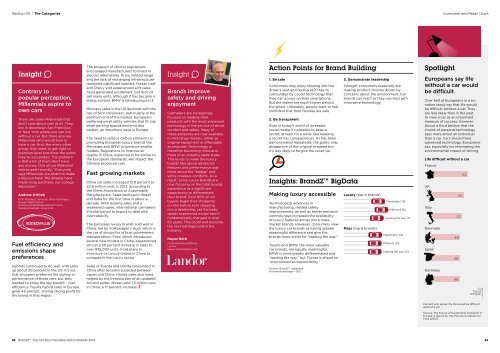download-report
download-report
download-report
Create successful ePaper yourself
Turn your PDF publications into a flip-book with our unique Google optimized e-Paper software.
Section 03 | The Categories<br />
Consumer and Retail | Cars<br />
Insight<br />
Contrary to<br />
popular perception,<br />
Millennials aspire to<br />
own cars<br />
There are some Millennials that<br />
don’t care about cars at all. They<br />
live in downtown San Francisco<br />
or New York where you can live<br />
without a car. But there also are<br />
Millennials who would love to<br />
have a car. And, like every other<br />
group, they want to get right to<br />
premium level and show the world<br />
they’ve succeeded. The problem<br />
is that a lot of them don’t have<br />
any money. One of our Millennial<br />
interns said recently, “Everyone<br />
says Millennials are afraid to make<br />
a big purchase. We already have<br />
made a big purchase, our college<br />
education.”<br />
Andrew Ortlieb<br />
SVP, Strategic Services, Brand Strategy<br />
Group Team Detroit<br />
andrew.ortlieb@teamdetroit.comA.<br />
Manago@added-value.com<br />
Fuel efficiency and<br />
emissions shape<br />
preferences<br />
Hybrids continued to do well, with sales<br />
up about 30 percent in the US. It’s not<br />
that shoppers preferred the styling or<br />
performance of those cars, but they<br />
wanted to enjoy the key benefit – fuel<br />
efficiency. Toyota hybrid sales in Europe<br />
grew 43 percent, driving strong profit for<br />
the brand in that region.<br />
The prospect of stricter regulations<br />
encouraged manufacturers to invest in<br />
electric alternatives. Price, limited range<br />
and the lack of recharging infrastructure<br />
remained significant barriers. Nissan Leaf<br />
and Chevy Volt experienced soft sales.<br />
Tesla generated excitement, but did not<br />
sell many units, although it has become a<br />
status symbol. BMW is introducing its i3.<br />
Minivans sales in the US declined with the<br />
rise of SUV crossovers, particularly at the<br />
premium end of the market. Europeans<br />
preferred small utility vehicles that fit into<br />
small parking spaces and emit less<br />
carbon, an important issue in Europe.<br />
The need to reduce carbon emissions is<br />
prompting European luxury brands like<br />
Mercedes and BMW to produce smaller<br />
models. Regulations to improve air<br />
quality in China, expected to be similar to<br />
the European standards, will impact the<br />
Chinese produced cars.<br />
Fast growing markets<br />
China car sales increased 13.9 percent to<br />
22.9 million units in 2013, according to<br />
the China Association of Automobile<br />
Manufacturers. Sales declined in Brazil<br />
and India for the first time in about a<br />
decade. With slowing sales and a<br />
weakened rupee, international carmakers<br />
in India turned to export to deal with<br />
overcapacity.<br />
The European luxury brands sold well in<br />
China, led by Volkswagen’s Audi, which is<br />
the car of choice for official government<br />
transportation. Ford, which introduced<br />
several new models in China, experienced<br />
almost a 50 percent increase in sales to<br />
over 935,000 units. Ford plans to<br />
introduce its Lincoln brand in China to<br />
compete in the luxury sector.<br />
Sales of Toyota and Honda rebounded in<br />
China after tensions subsided between<br />
Japan and China. Honda sales also were<br />
helped by the introduction of an updated<br />
Accord sedan. Nissan sold 1.3 million cars<br />
in China, a 17 percent increase.<br />
Insight<br />
Brands improve<br />
safety and driving<br />
enjoyment<br />
Carmakers are increasingly<br />
focused on loading their<br />
products with the most advanced<br />
technology in the service of driver<br />
comfort and safety. Many of<br />
these advances are now available<br />
in mid-range models, either as<br />
original equipment or affordable<br />
accessories. Technology is<br />
therefore becoming more and<br />
more of an industry table stake.<br />
This tends to make the luxury<br />
brands less about advanced<br />
features and performance and<br />
more about the “badge” and<br />
some creature comforts. As a<br />
result, some luxury brands are<br />
now focusing on the total buying<br />
experience as a significant<br />
opportunity to differentiate<br />
their brand. Over 80% of car<br />
buyers begin their shopping<br />
on-line before ever stepping<br />
into a dealership, yet the basic<br />
dealer experience model hasn’t<br />
fundamentally changed in over<br />
50 years. This could well become<br />
the next battleground in the<br />
industry.<br />
Hayes Roth<br />
Chief Marketing Officer<br />
Landor<br />
Hayes.roth@landor.com<br />
Action Points for Brand Building<br />
1. Be safe<br />
Consumers may enjoy slipping into the<br />
driver’s seat and feeling as if they’re<br />
surrounded by cooler technology than<br />
they can access on their smartphone.<br />
But the stakes are much higher behind<br />
the wheel. Ultimately, people want to feel<br />
confident that their families are safe.<br />
2. Be transparent<br />
Even in today’s world of incessant<br />
social media it’s possible to keep a<br />
secret, at least for a while. But keeping<br />
a secret has consequences. As has been<br />
demonstrated repeatedly, the public may<br />
disapprove of the original misdeed but<br />
it’s less likely to forgive the cover-up.<br />
Insights: BrandZ BigData<br />
Making luxury accessible<br />
Technological advances in<br />
manufacturing, related safety<br />
improvements, as well as better emission<br />
controls have increased the availability<br />
of luxury features across more massmarket<br />
brands. However, consumers view<br />
the luxury car brands as having greater<br />
meaningful difference and give the<br />
brands more credit for “leading the way.”<br />
Toyota and BMW, the most valuable<br />
car brands, are equally meaningful.<br />
BMW is more greatly differentiated and<br />
“leading the way,” but Toyota is ahead on<br />
“environmental responsibility.”<br />
Source: BrandZ database<br />
All brands average = 100<br />
3. Demonstrate leadership<br />
Younger consumers especially are<br />
making product choices driven by<br />
concerns about the environment. Car<br />
brands can react or they can lead with<br />
innovative technology.<br />
Luxury (top 4 brands)<br />
Mass (top 6 brands)<br />
Meaningful 118<br />
Different 132<br />
Leading the way 111<br />
Meaningful 106<br />
Different 103<br />
Leading the way 103<br />
Spotlight<br />
Europeans say life<br />
without a car would<br />
be difficult<br />
Over half of Europeans in a sixnation<br />
study say that life would<br />
be difficult without a car. They<br />
are less likely than in the past<br />
to view a car as an important<br />
measure of success, however.<br />
About a third believe that the<br />
choice of personal technology<br />
says more about an individual<br />
than a car. Cars should have<br />
advanced technology, Europeans<br />
say, especially for eliminating the<br />
environmental impact of driving.<br />
Life difficult without a car<br />
France<br />
UK<br />
Italy<br />
Denmark<br />
Spain<br />
Germany<br />
55<br />
52<br />
49<br />
48<br />
48<br />
62<br />
Percent who agree; My life would be difficult<br />
without a car.<br />
Source: The Future of Sustainable Transport in<br />
Europe, a <strong>report</strong> by The Futures Company for<br />
Ford (2012).<br />
62 BrandZ Top 100 Most Valuable Global Brands 2014 63



